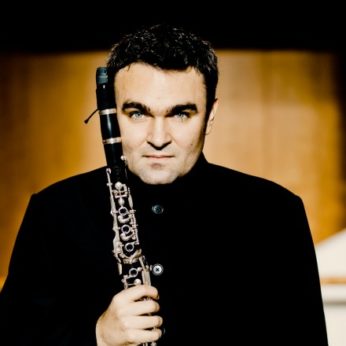Composer: Jörg Widmann (b. 1973)
Performance date: 29/06/2010
Venue: St. Brendan’s Church
Composition Year: 2004
Duration: 00:26:00
Recording Engineer: Anton Timoney, RTÉ lyric fm
Instrumentation Category:Octet
Instrumentation Other: cl, hn, bn, 2vn, va, vc, db
Artists:
Dominic Dudley -
[double bass]
Sarah McMahon -
[cello]
Rebecca Jones -
[viola]
Mihaela Girardi -
[violin]
Sarah Sexton -
[violin]
Bram Van Sambeek -
[bassoon]
Hervé Joulain -
[horn]
Jörg Widmann -
[clarinet]

Widmann’s Octet is a magnificent configuration of instruments,
achieving a breadth of timbre equal to an orchestra yet preserving the intimacy
of a small chamber ensemble. The instruments are the same as those chosen by
Schubert for his Octet and keen listeners will find many parallels between the
works.
The Intrada opens with a direct quote from
Schubert’s Octet, Widmann making the genealogy of his composition clear. Unlike
Schubert’s work, which lifts us slowly into an uneasy sense of jubilation,
combining the most ecstatic passages with undertones of sorrow, Widmann takes
us on a slowly devastating journey, mapping many shades of pathos. Yet somehow
the movement also has a harmonic luxuriousness, never indulgently atonal, or
dissonant; always replete with connotations of romanticism.
The Menuetto opens with a call to the hunt on a
horn filled with bravado. Its confidence is deceiving, and is rapidly subsumed
in a flurry of scurrying passages, insistent and frantic like the pulse of a
terrified animal. The theme of the hunt returns, albeit less confident, its
swaggering confidence tainted by the violent reality of the chase. The movement
concludes with the plaintive sound of the solitary clarinet fading into
silence.
The third movement, the Song without Words is the pivotal point of the
composition, its disparate crux threaded together from fragmentary moments of
lyrical beauty. It opens with a heart wrenching passage for clarinet and
violins, the skeletal and drifting melodies then slowly passed around different
configurations of instruments. The ensemble is united in a series of
overwhelming crescendos, before collapsing into its constituent elements, into
an array of quiet and insular spaces.
A long menacing note on the Double
Bass opens the Intermezzo, rising slowly like the onset of
anxiety. The ensuing passages are populated by clattering pizzicato, furious
glissandi, and sudden interjections, as if each instrument were jostling to
find a voice. Shades of the hunt and its romantic connotations resurface
briefly among the crowded sounds, only to be quickly subsumed in the morass of
voices.
The Finale begins with recapitulation of the
opening theme, drawing us full circle to the opening seconds of the work. It is
a partial and tantalising return that ebbs
and fades quickly into an abrupt false ending. If applause is withheld we are
treated to a stunning silence, before the instruments climb back into noise and
a gradually formed uneasy accord.
Copyright © 2024 West Cork Music. All rights reserved.
Designed and developed by Matrix Internet